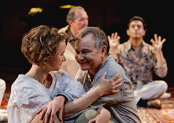OPERA SEARCH

Leyla und Medjnun
(Layla and Majnun) Fairytale for music (1988/2016)Libretto by Aras Ören and Peter Schneider; Italian translation by Marco Marica and Matteo D'Amico (G,I)
3S,M,3T,2Bar,speaking role;
1(=afl,picc).1(=corA).1(=bcl).1(=dbn)-1.0.0.0-perc(1)-harp-pft(=cel)-ud-strings(1.1.1.1.1)
Abbreviations (PDF)
Bote & Bock
Ballhof Eins, Hannover
Sebastian Welker, director
Conductor: Siegmund Weinmeister
Company: Staatsoper Hannover
| LEYLA | Soprano |
| MEDJNUN | Tenor |
| FATHER / HUNTER / DOCTOR | Baritone |
| MOTHER / GIRAFFE | Mezzo-Soprano |
| DEAR / PUPIL | Soprano |
| WARRIOR / BRIDEGROOM / MERCHANT / PUPIL | Tenor |
| LIONESS / MERCHANT | Bass Baritone |
| MORNING BIRD / PUPIL | Soprano |
| FOX / MERCHANT / PUPIL | High Baritone |
| ZENNE | speaking role |
Zenne, a Turkish magician, tells this Arabian fairytale from a present-day standpoint, cynically and without pathos. He directs the action, commentates, and decides on the fate of the characters: Leyla and Medjnun love each other, but the society in which they live forbids their attachment. Medjnun is a poet and is in love with love; but Leyla loves the human being in Medjnun. People think Medjnun is mad for he composes poem after poem, celebrating his love in verse. Nobody understands Medjnun, so he goes off into the desert. There, he converses with the animals, for the power of his love has bestowed their language on him. A physician comes to try and heal him, his father wants to bring him back – but to no avail. Medjnun becomes more and more lost in reverie. Leyla is pining away with love for Medjnun but is forced to marry another man chosen by her parents. Finally, the power of Medjnun´s poetry unleashes a war for a love which in essence only harbours death. Leyla goes into a decline and dies.
"The libretto: a story as old as mankind. Leyla and Medjnun are inseparable. Only their families have anything against their liaison – then the clan becomes a hate-filled mob, and the lovers are violently separated… Glanert’s music is entirely at the service of the emotional structure of the story: from soaring intimacy to expressive ordeal, it portrays the age-old themes of Romeo and Juliet or Orpheus. Glanert’s crossover with the ancient Persian musical tradition is particularly exciting… he adds an oud, an oriental lute, which enters with constantly circling motifs, commenting on the events…"
Neue Presse Hannover
Poetic
